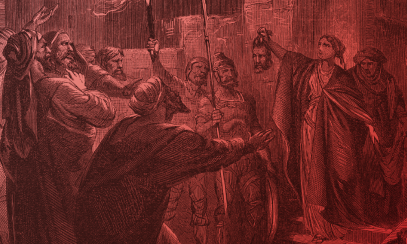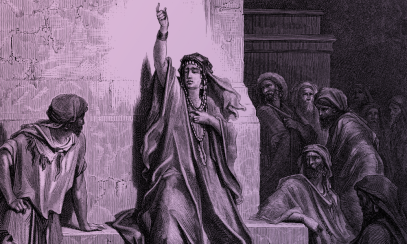
Encountering Jesus in the Sacrament of Marriage
Marriage is more than just a natural institution – God is its author and it has been elevated by Christ to the level of sacrament. Marriage is a gift that we receive rather than something we construct or change to fit our purposes.
In the 2009 pastoral letter, “Marriage: Love and Life in the Divine Plan,” the United States Conference of Catholic Bishops (USCCB) wrote, “Through baptism, men and women are transformed, by the power of the Holy Spirit, into a new creation in Christ. This new life in the Holy Spirit heals men and women from sin and elevates them to share in God’s very own divine life. It is within this new Christian context that Jesus has raised marriage between the baptized to the dignity of a sacrament. He heals marriage and restores it to its original purity of permanent self-giving in one flesh (see Mt 19:6).” By revealing his own love as the perfection of all love, he reveals the deepest meaning of all marital love: self-giving love modeled on God’s inner life and love.
In the beginning …
The profound way the sacrament of marriage allows us to share in God’s own life is vividly illustrated in the Book of Genesis. We are taught that at each phase of creation God issues a command to "Let there be …" and it comes to pass. Something new comes into being that did not exist a moment before. This command is, in a sense, the verbal manifestation of God's free consent to create.
The spouses participate in this same act of creation during the marriage ceremony where the two are required to consent before the community to the creation of the union. The catechism (1626-27) teaches that the exchange of consent between the spouses, their mutual “Let there be …”, is the indispensable element that “makes the marriage” and brings the marriage into being as a new creation.
However, Genesis also teaches that this initial consent is not sufficient for the maintenance of creation. "Then God said, 'Let there be light,' and there was light. God saw how good the light was." (Gn 1: 3-4) Here we have the consent followed by the affirmation that it is good for the light to exist. This formula is repeated with each step of creation. There is the consent and then the affirmation, which signals that what has been created should continue in existence. It is this affirmation that creation is good that is the foundation of our very being.
So at each moment, God holds creation in existence through affirmation. Without this continuous commitment to affirmation, creation would simply pass away. The story of Noah's ark and other biblical accounts illustrate the destruction that results when this affirmation is taken away.
In the same way, marriage is an invitation into this same loving commitment and powerful participation in the life of God. But the demands that go with such participation are no less applicable.
A choice
Years ago, Father Lawrence Hennessey, a seminary professor in Chicago, was teaching a workshop on the topic of celibacy to a group of seminarians. He declared that “celibacy is a choice … and one has to choose it every day.” The same is true of marriage. Marriage is a choice … and the spouses have to choose it every day! A marriage has to be continuously affirmed.
It is the continual affirmation of the spouses that what came into existence on the wedding day is good that holds the marriage in existence – that sustains the marriage. When either or both of the spouses take away this affirmation, when one or both no longer see that the marriage is good, the marriage begins to pass out of existence. What a wondrous gift and tremendous responsibility!
The grace of the sacrament
The good news is that we are not on our own. According to the catechism (1661), the sacrament of matrimony provides the spouses with the grace to “love each other with the love with which Christ has loved his Church.” This grace “perfects the human love of the spouses, strengthens their indissoluble unity, and sanctifies them on the way to eternal life.” Its effects include the arising of a bond between the spouses which is perpetual and exclusive, as the covenant between the spouses is integrated into God’s covenant with humanity (1638-39) and the receiving of Christ’s grace by the spouses to assist them in helping each other “to attain holiness in their married life and in welcoming and educating their children.” (1641)
A prayer to the patron
St. Valentine is the patron of love, happy marriages, engaged couples and young people. While there are actually three different Valentines (a priest in Rome, a bishop of present day Terni, Italy, and a martyr in the Roman province of Africa) associated with Feb.14, they are united in their martyrdom for Christ.
Consider praying a novena to St. Valentine as a couple, invoking his intercession to help strengthen the marriage, especially in times of trial, over a period of nine days.
St. Valentine,
look with pity upon our wants,
hear our requests,
attend to our prayers,
relieve by your intercession the miseries
under which we labor,
and obtain for us the divine blessing,
that we may be found worthy to join you
in praising the Almighty for all eternity:
through the merits of our Lord Jesus Christ.
Amen.
Did you know?
In the Roman Catholic tradition, the spouses are the ministers of Christ’s grace. They mutually confer upon each other the sacrament by expressing their consent before the Church.
At the same time, it is the priest (or deacon) who receives the consent of the spouses in the name of the Church and gives the blessing of the Church. This is critical because the sacrament is an ecclesial reality, a liturgical act. This is why a sacramental marriage should be celebrated in the public liturgy of the Church.
Source: Catechism (1623, 1630-31)
USCCB Resources for strengthening marriage
Check out a special website set up by the USCCB specifically for married couples called “For Your Marriage” at www.foryourmarriage.org.
Doug Culp is Secretary for Pastoral Life & Bishop’s Delegate for Administration in the Diocese of Lexington. He holds an MA in theology from Catholic Theological Union in Chicago.



